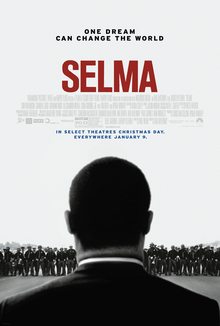Friday, January 23, 2015
SELMA review
Towards the end of every year, it's always the same thing: audiences are inundated with movie after movie that are begging for awards attention. You can always see it coming, whether the film is fronted by an up-and-coming actor or an old veteran who has long deserved his/her recognition, there's almost no shame anymore when it comes to Oscar season. This makes it easy to be cynical about all these historical/costume dramas or serious biopics that come out at the end of each year: often times, these films are so vanilla, so eager not to offend, that they really do not appear to have much to say about the periods, or people, they depict.
So it's refreshing when we get a biopic that absolutely has something to say, whether it's about the time period and location it's set during, or about the times we live in today. It's been almost 50 years since his assassination, yet it wasn't until late last year that audiences were able to see a movie about Martin Luther King, Jr. Luckily for us, this isn't just your run-of-the-mill biopic drama that depicts the rise of America's most famous civil rights activist. There's much more going on here.
Director Ava DuVernay and screenwriter Paul Webb have decided to tell the story of just one crucial period of MLK's life: the 1965 march from Selma to Montgomery that protested in favor of fairer voting rights for African-Americans in the South. And within this specific time frame, we are given genuine insight into the mind of Martin Luther King. In 125 minutes, we get a deep understanding of what made the man tick. Why non-violent protests? Why Selma? Why demand freer voting rights now? Why did he, along with thousands of other protestors, decide to march one day, but not the next?
What about his marriage to Coretta Scott King? Was it all peaches and cream? Did he share a friendly relationship with President Lyndon B. Johnson? When he decided to embark on his march from Selma to Montgomery, was everyone on his side initially? Did he have a favorable relationship with Malcolm X? This film addresses all of these questions head on and delves into all the complexities and harsh truths that surrounded Martin Luther King at the time. This was not a man who was universally revered, obviously, when he lead all these non-violent protests. If you were to tell him back in 1965 that his birthday would become a national holiday several years later, he'd probably think you were crazy.
Most importantly, there is a tendency among biopics to make its subjects seem larger than life. But DuVernay and Webb make it clear that this is a man who had some flaws. Maybe he was a little arrogant in places, maybe he could've had a better relationship with his wife. Because he was so dedicated to all these civil rights causes, that meant being away from his wife and kids for great amounts of time. Everytime he went out on the streets, he was risking his life. Coretta Scott King, beautifully portrayed by Carmen Ejogo, forces us to realize that MLK was not exactly Mr. Charisma when he was at home. MLK was a man who did some extraordinary things, but "Selma" emphasizes that, yes, he was a man. A man with flaws. A man who was a lot more grounded in the real world than you might have imagined. A man who, at times, worried that his actions would bring on severe consequences. By having all these flaws revealed to us, we're able to gain an even deeper respect for the man. "Selma" deserves all the credit in the world for grounding this beloved historical figure in ways that even tops how Abraham Lincoln was depicted in Spielberg's "Lincoln."
This is a firecracker of a film and it's lead by David Oyelowo's rousing performance. He was tasked with the near-impossible. We all know MLK's voice. We've all heard his "I have a dream..." speech. We all have a fairly elaborate impression of the man. Oyelowo really allowed himself to sink into this character and embody him without ever feeling like a caricature. And while Tom Wilkinson's performance as Lyndon B. Johnson is certainly solid, both he and Tim Roth's George Wallace do occasionally feel a bit cartoonish. Luckily, the script is so tight that the occasional shakiness of those performances never fully waver.
And even so, while there have been various reports regarding the film's depiction of President Johnson, I personally found those reports to be quite unnecessary. After all, nobody in this film is depicted as a saint so why should LBJ be any different? He doesn't need to be defended. His reluctance to follow through on MLK's plans is actually not all that hard to understand. You can say it was just a sign of the times, but look how carefully Obama has publicly reacted to the events in Ferguson and Staten Island.
Therein lies the brilliance of "Selma." It brings up MLK's march from Selma to Montgomery while also raising questions about race relations in this country today. The wounds still have not fully healed 50 years later. There is still anger. There is still hatred. And yes, there is still racism. MLK Jr. was a man who knew he could not build Rome in a day, but understood that he had to act drastically if he really wanted to get things done. He accomplished plenty during his brief lifetime, but as the movie cautiously reminds at the very end, there's still a lot of work to do.
Grade: A
Subscribe to:
Post Comments (Atom)

No comments:
Post a Comment